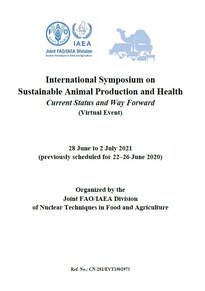 Announcement and Call for Papers A. Background The International Symposium on Sustainable Animal Production and Health – Current Status and Way Forward, postponed due to the COVID-19 pandemic, will draw on lessons learned and current best practices to provide a roadmap for the sustainable improvement of animal production whilst protecting the environment. The focus of the symposium will be on the contributions and impact of nuclear technologies and applications. B. Objectives The purpose of the symposium is:
0 Comments
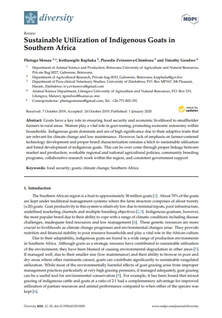 Abstract: Goats have a key role in ensuring food security and economic livelihood to smallholder farmers in rural areas. Women play a vital role in goat rearing, promoting economic autonomy within households. Indigenous goats dominate and are of high significance due to their adaptive traits that are relevant for climate change and low maintenance. However, lack of emphasis on farmer-centered technology development and proper breed characterization remains a hitch to sustainable utilization and breed development of indigenous goats. This can be over come through proper linkage between market and production, workable regional and national agricultural policies, community breeding programs, collaborative research work within the region, and consistent government support. Keywords: food security; goats; climate change; Southern Africa 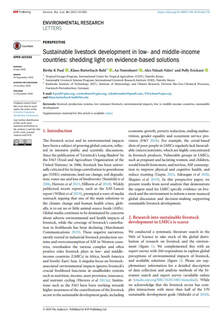 1. Introduction The livestock sector and its environmental impacts have been a subject of growing global concern, reflected in intensive public and scientific discussions. Since the publication of ‘Livestock’s Long Shadow’ by the FAO (Food and Agriculture Organization of the United Nations) in 2006, livestock has been universally criticized for its large contribution to greenhouse gas (GHG) emissions, land use change, soil degradation, water use and loss of biodiversity (Steinfeld et al 2006, Herrero et al 2015, Hilborn et al 2018). Widely publicized recent reports, such as the EAT-Lancet report (Willett et al 2019), prompted a wave of media outreach arguing that one of the main solutions to the climate change and human health crises, globally, is to eat no or little animal source foods (ASFs). Global media continues to be dominated by concerns about adverse environmental and health impacts of livestock, while the coverage of livestock’s contribution to livelihoods has been declining (Marchmont Communications 2019). These negative narratives, mostly rooted in industrial livestock production systems and overconsumption of ASF in Western countries, overshadow the various complex and often positive roles livestock plays in low- and middle income countries (LMICs) in Africa, South America and South(-East) Asia. A singular focus on livestock associated environmental impacts ignores livestock’s crucial livelihood functions in smallholder systems such as nutrition, income, asset provision, insurance, and nutrient cycling (Herrero et al 2013a). Institutions such as the FAO have been working towards higher awareness of the contributions of the livestock sector to the sustainable development goals, including economic growth, poverty reduction, ending malnutrition, gender equality and ecosystem service provision (FAO 2018). For example, the cereal-based diets of poor people in LMICs regularly lack bioavailable (micro)nutrients, which are highly concentrated in livestock products. Vulnerable groups in LMICs, such as pregnant and lactating women, and children, would benefit from more, and not less, ASF consumption to improve physical and cognitive health, and reduce stunting (Gupta 2016, Adesogan et al 2020, Shapiro et al 2019). In this perspective paper, we present results from novel analysis that demonstrate the urgent need for LMIC-specific evidence on livestock and the environment to inform a more nuanced global discussion and decision-making supporting sustainable livestock development. 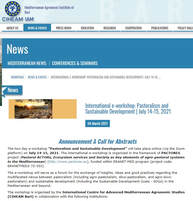 Announcement & Call for Abstracts The two-day e-workshop “Pastoralism and Sustainable Development” will take place online (via the Zoom platform) on July 14-15, 2021. The international e-workshop is organized in the framework of PACTORES project (Pastoral ACTORs, Ecosystem services and Society as key elements of agro-pastoral systems in the Mediterranean) (http://www.pactores.eu), funded within ERANET-MED program (project code: ERANETMED2-72-303). The e-workshop will serve as a forum for the exchange of insights, ideas and good practices regarding the multifaceted nexus between pastoralism (including agro-pastoralism, silvo-pastoralism, and agro-silvo-pastoralism) and sustainable development (including the Sustainable Development Goals - SDGs) in the Mediterranean and beyond. 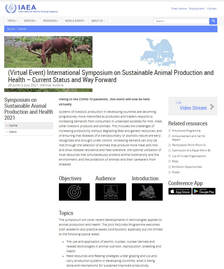 28 June - 2 July 2021, Vienna, Austria Owing to the COVID-19 pandemic, this event will now be held virtually. Systems of livestock production in developing countries are becoming progressively more intensified as producers and traders respond to increasing demands from consumers in urbanized societies for milk, meat, other livestock products and animals. This includes the challenges of increasing productivity without degrading feed and genetic resources, and of ensuring that diseases of a transboundary or zoonotic nature are early recognized and brought under control. Increasing demand can only be met through the selection of animals that produce more meat and milk and show disease resistance and heat tolerance; the optimal utilization of local resources that simultaneously protects animal biodiversity and the environment; and the protection of animals and their caretakers from diseases. 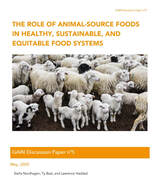 download PDF download PDF Among the major issues facing the global population are persistent malnutrition (including both undernutrition and overweight/obesity), climate change, and environmental degradation. At the crossroads of these issues, animal-source food (ASF; meat, poultry, fish, dairy, and eggs) have attracted considerable attention for both their role in diets and their environmental impacts–and their production also plays an important role in livelihoods, particularly in low- and middle-income countries (LMICs). As these issues are intertwined, they must be considered jointly and with sufficient recognition of the nuance involved. This paper aims to add to this debate through a review and discussion of evidence on ASF spanning several dimensions: nutrition, health, environment, livelihoods, and equity. DOWNLOAD A PDF COPY. Job Description:
The Department of Animal and Dairy Sciences is seeking an Assistant Extension Professor for a 12-month tenure track (60% Extension/40% Research) position to coordinate statewide Sustainable Agriculture Research and Education (SARE) programs as well as develop extension and research programs in small ruminant health, reproduction or management. The Animal and Dairy Sciences Department currently houses approximately 380 undergraduate students, 25 graduate students and 22 faculty, both on campus and at research and extension centers throughout Mississippi. The Department conducts teaching, research and extension activities on the 1200 acre south farm that includes a research sheep herd. The Department began operations on a new 15,000 ft2 Meat Science and Muscle Laboratory in July of 2018 and will move into a new 38,000 ft2 Animal and Dairy Sciences Building in June of 2019. The Department offers Bachelors of Science degrees with concentrations in Pre-Vet/Science, Animal Production, and Business and Industry. Both M.S. and Ph.D. degrees are offered from within the College of Agriculture and Life Sciences in Animal and Dairy Sciences. 7th International Conference on Sustainable Animal Agriculture for Developing Countries (SAADC 2019)2/19/2019 “Eco-friendly Animal Production for Profitable Smallholder Farming" 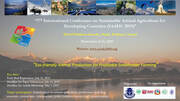 November 8-11, 2019 Hotel Pokhara Grade, Pokhara, Nepal Website: www.saadc2019.org Key dates: Deadline for Article Mentoring: May 1, 2019 Deadline for Paper Submission: July 15, 2019 Early bird registration: July 31, 2019 Target participants: Stakeholders in animal agriculture production including scientists, researchers, veterinarians, policy makers, farmers and entrepreneurs. Burkina Faso study quantifies impact of sustainable intensification on household food security9/20/2018 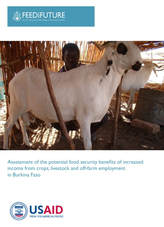 Download the report Download the report Sustainable intensification (SI) of agricultural production has become a predominant theme in development agendas in West Africa. But despite the availability of a wide range of technologies for adoption, uptake has been very minimal. One reason for the often-disappointing uptake of technologies could be poor targeting of households. Researchers at the International Livestock Research Institute (ILRI) have analysed and quantified the potential food security impact of boosting a set of sustainable intensification options in Burkina Faso to better identify which technologies would fit the characteristics of specific households. The research activities were designed to be solution-focused to meet the needs of farmers and were implemented in Seno and Yatenga provinces in the Sahelian zone of the country. The basis of the study is that there is a great potential for smallholder farmers engaged in crop-livestock systems, to produce more in a given area of land, thereby improving productivity, food security and nutrition while preserving ecosystem services. READ MORE… Making the Case: Sustainable Livestock for Development
Livestock are critical for sustainable development yet often overlooked. The world’s cows, sheep, goats, pigs, poultry and other farm animals are the mainstay of livelihoods across the developing world. And the energy and nutrient-dense milk, meat and eggs these animals produce provide hundreds of millions of families in the world’s poorer countries with basic livelihoods, incomes, food and nutrition. |
IGA Blog
The International Goat Association promotes goat research and development for the benefit of humankind, to alleviate poverty, to promote prosperity and to improve the quality of life. Archives
May 2024
Categories
All
|
|
International Goat Association
2516 Millbrook Rd., Little Rock, AR72227 USA email: [email protected] -454-1641 |
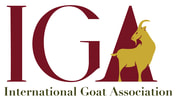
 RSS Feed
RSS Feed